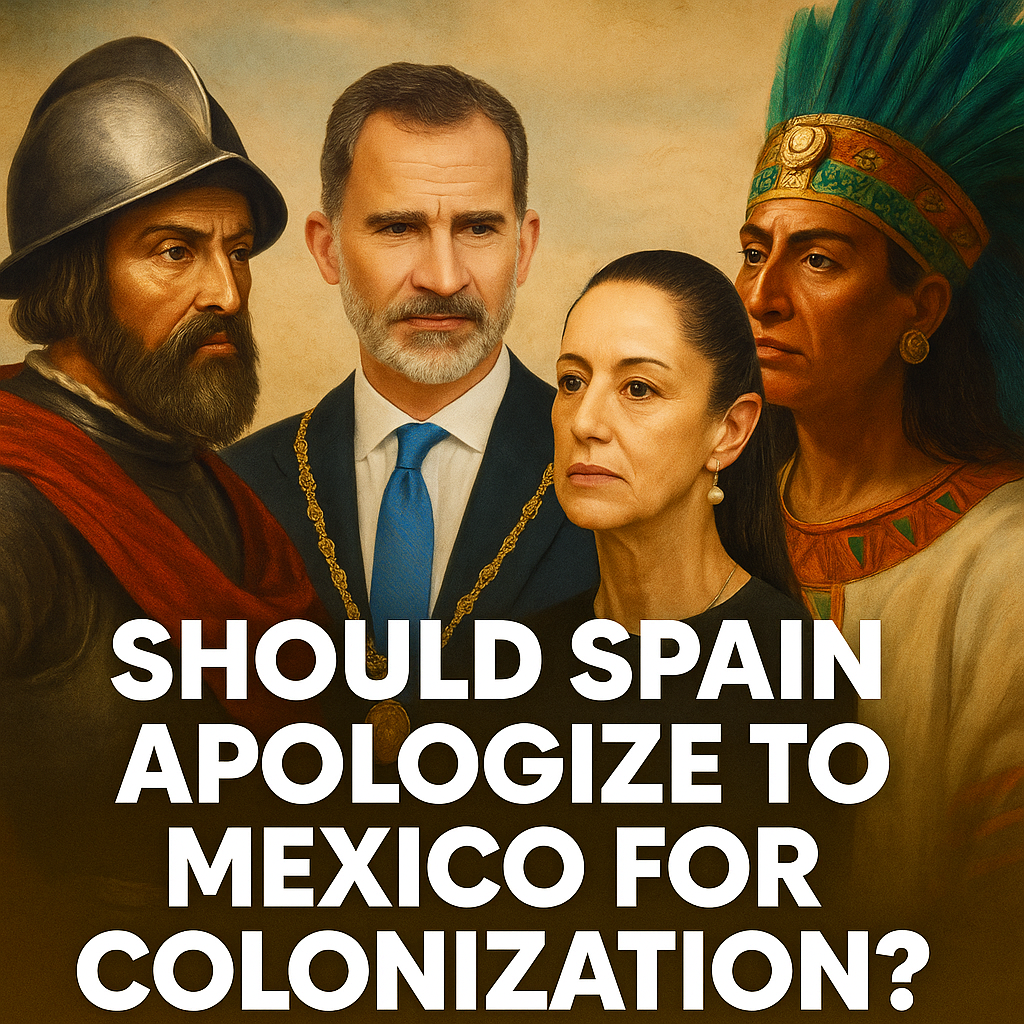No Apology Needed? The Case Against Spain’s Remorse for Mexico’s Colonization
More than 500 years after Hernán Cortés arrived in what is now Mexico, the question still divides historians, politicians, and citizens alike: Should Spain formally apologize for colonizing Mexico? - Rafael Benavente

Should Spain Apologize to Mexico for Colonization? Rethinking the Conquest Debate
By Rafael Benavente
More than 500 years after Hernán Cortés arrived in what is now Mexico, the question still divides historians, politicians, and citizens alike: Should Spain formally apologize for colonizing Mexico?
In recent years, the topic has re-entered the spotlight due to political requests, cultural reflection, and a deeper reexamination of what the conquest truly meant. But behind the calls for apology lies a more nuanced truth — one that reveals just how complex the legacy of colonization really is.
🇪🇸 Recent Diplomatic Tensions
In 2019, President López Obrador requested a formal apology from Spain and the Catholic Church for the violent conquest of Mexico. In 2024, Spain responded with a letter to new President Claudia Sheinbaum, citing the 1839 Treaty of Peace and Friendship and reaffirming the historical closure of colonial disputes.
Despite the gesture, no formal apology was issued — and the move was met with mixed reactions.
🛡️ What the Aztecs Were — and Weren’t
Understanding the legacy of colonization requires a clear-eyed view of the Aztec Empire.
The Aztecs were powerful, but not universally loved. They ruled through a combination of military dominance, economic control, and religious ritual. One of the key reasons Hernán Cortés succeeded was because indigenous rival tribes, like the Tlaxcalans, allied with him. These alliances were driven by resentment of Aztec brutality, including their large-scale human sacrifice practices. Some estimates suggest the Aztecs killed 4 people per day in religious ceremonies.
In this light, the conquest was not simply a foreign invasion — it was also an indigenous civil war.
🧠 Professor Zunzunegui’s Take: History Isn’t Black and White
In a widely viewed DW interview, Mexican historian Juan Miguel Zunzunegui dismantles the idea that colonization was a simple matter of good versus evil.
“We’ve allowed history to be used as a weapon. But history isn’t about apologies — it’s about understanding,” he says.
Zunzunegui points out that:
- Spain didn’t commit a genocide; it built a society, one in which Spanish and indigenous peoples intermixed and intermarried.
- The Spanish Empire preserved indigenous languages, documented native traditions, and fostered a mestizo identity — unlike many other colonizing powers that sought total erasure.
- Asking for an apology in modern times ignores historical context and risks reducing a complex past into a political slogan.
“Had another European power colonized Mexico — say Britain or Belgium — the result may have been far more destructive,” he notes.
✍️ My Perspective: Spain Should Not Apologize
I stand with Professor Zunzunegui on this.
The Spanish conquest was violent — but it was not a one-sided massacre of innocents. The Aztecs were not angels. They dominated, sacrificed, and enslaved other tribes. Without Spain, it’s plausible that Mexico may have remained locked in a violent imperial cycle or been colonized by a more exploitative empire.
Spain, while not without fault, also helped preserve and shape Mexico’s modern identity. They brought Catholicism, architecture, agriculture, and education systems — but also incorporated indigenous culture into this foundation. The very idea of “Mexican” today is a result of that blending.
Furthermore, most Spanish colonists weren’t imperial overlords — they were settlers who often formed families with native peoples, creating a new shared lineage that defines Mexico to this day.
🧭 Reconciliation Without Revisionism
Calls for apology may seem like a pathway to healing — but in this case, they may do more harm than good. They risk framing history in simplistic terms and weaponizing memory instead of learning from it.
Instead of apologies, we should focus on:
- Education: Teaching the full scope of colonization, including both atrocities and achievements.
- Respect: Honoring indigenous cultures not with symbolic gestures but real policy, inclusion, and preservation.
- Dialogue: Recognizing how colonial legacy affects the present — in inequality, race, and geopolitics.
📚 Further Reading
- Global Voices: Why Does the Spanish Crown Refuse to Apologize?
- Mexico News Daily: We've Been Here Before
- Mexico Daily Post: Spain’s Letter to Claudia Sheinbaum
- DW Interview with Juan Miguel Zunzunegui
🧠 Final Thought
We can’t change the past. But we can change how we remember it, teach it, and build from it.
Let’s not demand apologies from history. Let’s learn from it — honestly, fully, and together.
By Rafael Benavente
